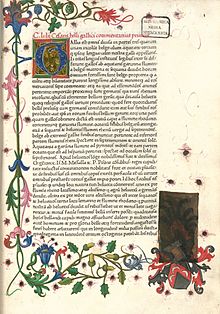
Back تعليقات على الحرب الغالية Arabic Запіскі пра Гальскую вайну Byelorussian Записки за Галската война Bulgarian De Bello Gallico Breton Guerra de les Gàl·lies (llibre) Catalan Zápisky o válce galské Czech Commentarii de Bello Gallico Danish De bello Gallico German Απομνημονεύματα περί του Γαλατικού πολέμου Greek De Bello Gallico Esperanto
 First page of De bello Gallico, from the editio princeps of Sweynheym and Pannartz, Rome, 1469 | |
| Author | Julius Caesar (books 1–7), Aulus Hirtius (book 8) |
|---|---|
| Language | Classical Latin |
| Subject | History, ethnography, military history |
| Publisher | Julius Caesar |
Publication date | 58–49 BC |
| Followed by | Commentarii de Bello Civili |
 |
| Part of a series on the |
| Military of ancient Rome |
|---|
|
|
Commentarii de Bello Gallico (Classical Latin: [kɔm.mɛnˈtaː.ɾi.iː deː ˈbɛl.loː ˈɡal.lɪ.koː]; English: Commentaries on the Gallic War), also Bellum Gallicum (English: Gallic War), is Julius Caesar's firsthand account of the Gallic Wars, written as a third-person narrative. In it, Caesar describes the battles and intrigues that took place in the nine years he spent fighting the Celtic and Germanic peoples in Gaul that opposed Roman conquest.
The "Gaul" that Caesar refers to is ambiguous, as the term had various connotations in Roman writing and discourse during Caesar's time. Generally, Gaul included all of the regions primarily inhabited by Celts, aside from the province of Gallia Narbonensis (modern-day Provence and Languedoc-Roussillon), which had already been conquered in Caesar's time; therefore encompassing the rest of modern France, Belgium, Western Germany, and parts of Switzerland. As the Roman Republic made inroads deeper into Celtic territory and conquered more land, the definition of "Gaul" shifted. Concurrently, "Gaul" was also used in common parlance as a synonym for "uncouth" or "unsophisticated" as Romans saw Celtic peoples as uncivilized compared with themselves.[a]
The work has been a mainstay in Latin instruction because of its simple, direct prose. It begins with the frequently quoted phrase Gallia est omnis divisa in partes tres, meaning "Gaul is a whole divided into three parts".[1] The full work is split into eight sections, Book 1 to Book 8, varying in size from approximately 5,000 to 15,000 words. Book 8 was written by Aulus Hirtius, after Caesar's death.
Although most contemporaries and subsequent historians considered the account truthful, 20th-century historians have questioned the outlandish claims made in the work. Of particular note are Caesar's claims that the Romans fought Gallic forces of up to 430,000 (a size believed to be impossible for an army at that time), and that the Romans suffered no deaths against this incredibly large force.
Cite error: There are <ref group=lower-alpha> tags or {{efn}} templates on this page, but the references will not show without a {{reflist|group=lower-alpha}} template or {{notelist}} template (see the help page).
- ^ As translated by H. J. Edwards in the Loeb Classical Library edition.